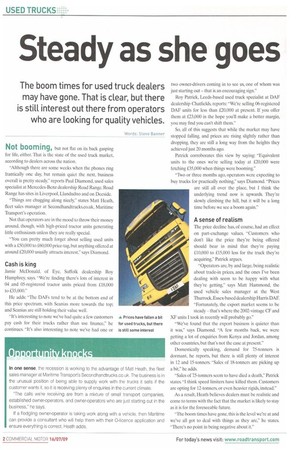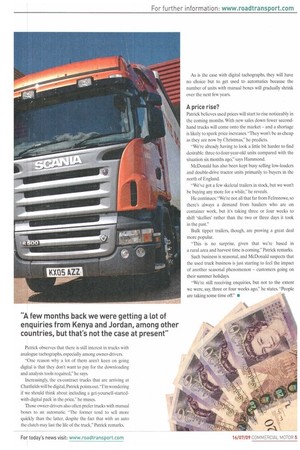Steady as she goes
Page 52

Page 53

If you've noticed an error in this article please click here to report it so we can fix it.
The boom times for used truck dealers may have gone. That is clear, but there is still interest out there from operators who are looking for quality vehicles.
Not booming, but not flat on its back gasping for life, either. That is the state of the used truck market, according to dealers across the nation.
"Although there are some weeks when the phones ring frantically one day, but remain quiet the next, business overall is pretty steady," reports Paul Diamond. used sales specialist at Mercedes-Benz dealership Road Range. Road Range has sites in Liverpool, Llandudno and on Deesidc.
-Things are chugging along nicely," states Matt Heath, fleet sales manager at Secondhandtrucks.co.uk, Maritime Transport's operation.
Not that operators are in the mood to throw their money around, though, with high-priced tractor units generating little enthusiasm unless they are really special.
"You can pretty much forget about selling used units with a ,E50,000 to £60,000 price-tag, but anything offered at around £20,000 usually attracts interest," says Diamond.
Cash is king
Jamie McDonald, of Eye, Suffolk dealership Roy Humphrey, says. "We're finding there's lots of interest in 04 and 05-registered tractor units priced from £18,000 to £35,000."
He adds: "The DAFs tend to be at the bottom end of this price spectrum, with Scanias more towards the top; and Scanias are still holding their value well.
"It's interesting to note we've had quite a few customers A Prices have fatten a bit pay cash for their trucks rather than use finance," he for used trucks, but there continues. "It's also interesting to note we've had one or is stitt some interest
two owner-drivers coming in to see us, one of whom was just starting out that is an encouraging sign."
Roy Patrick, Leeds-based used truck specialist at DAF dealership Chatfields, reports: "We're selling 06-registered DAF units for less than £20,000 at present. If you offer them at £23,000 in the hope you'll make a better margin, you may find you can't shift them."
So, all of this suggests that while the market may have stopped falling, and prices are rising slightly rather than dropping, they are still a long way from the heights they achieved just 20 months ago.
Patrick corroborates this view by saying: "Equivalent units to the ones we're selling today at £20,000 were fetching £35,000 when things were booming."
"Two or three months ago, operators were expecting to buy trucks for practically nothing," says Diamond. -Prices are still all over the place, but I think the underlying trend now is upwards. They're slowly climbing the hill, but it will be a long time before we see a boom again."
A sense of realism
The price decline has, of course, had an effect on part-exchange values. "Customers who don't like the price they're being offered should bear in mind that they're paying £10,000 to £15,000 less for the truck they're acquiring," Patrick argues.
"Operators are, by and large, being realistic about trade-in prices, and the ones I've been dealing with seem to be happy with what they're getting," says Matt Hammond, the used vehicle sales manager at the West Thurrock, Essex-based dealership Harris DAF. "Fortunately, the export market seems to be steady that's where the 2002-vintage CF and XF units I took in recently will probably go."
"We've found that the export business is quieter than it was," says Diamond. "A few months back, we were getting a lot of enquiries from Kenya and Jordan, among other countries, but that's not the case at present."
Domestically speaking, demand for 7.5-toriners is dormant, he reports, but there is still plenty of interest in 12 and 15-tonners. "Sales of 18-tonners are picking up a bit," he adds, "Sales of 7.5-tonners seem to have died a death," Patrick states. "I think speed limiters have killed them. Customers are opting for 124onners, or even heavier rigids, instead."
As a result. Heath believes dealers must be realistic and come to terms with the fact that the market is likely to stay as it is for the foreseeable future.
"The boom times have gone, this is the level we're at and we've all got to deal with things as they are," he states. "There's no point in being negative about it. Patrick observes that there is still interest in trucks with an ogue tachographs, especially among owner-drivers.
ne reason why a lot of them aren't keen on going di tal is that they don't want to pay for the downloading aria analysis tools required," he says. 4icreasingly, the ex-contract trucks that are arriving at Chatfields will be digital, Patrick points out. "I'm wondering if we should think about including a get-yourself-startedwit -digital pack in the price," he muses.
Iliose owner-drivers also often prefer trucks with manual boxes to an automatic. "The former tend to sell more quickly than the latter, despite the fact that with an auto thelclutch may last the life of the truck," Patrick remarks.
A price rise?
Patrick believes used prices will start to rise noticeably in the coming months. With new sales down fewer secondhand trucks will come onto the market — and a shortage is likely to spark price increases. "They won't be as cheap as they are now by Christmas," he predicts.
"We're already having to look a little bit harder to find desirable three-to-four-year-old units compared with the situation six months ago," says Hammond.
McDonald has also been kept busy selling low-loaders and double-drive tractor units primarily to buyers in the north of England.
"We've got a few skeletal trailers in stock, but we won't be buying any more for a while," he reveals.
He continues: "We're not all that far from Felixstowe, so there's always a demand from hauliers who are on container work, hut it's taking three or four weeks to shift `skellies' rather than the two or three days it took in the past."
Bulk tipper trailers, though, are proving a great deal more popular.
"This is no surprise, given that we're based in a rural area and harvest time is coming," Patrick remarks.
Such business is seasonal, and McDonald suspects that the used truck business is just starting to feel the impact of another seasonal phenomenon — customers going on their summer holidays.
"We're still receiving enquiries, but not to the extent we were, say, three or four weeks ago," he states. "People are taking some time off." •




















































































































































